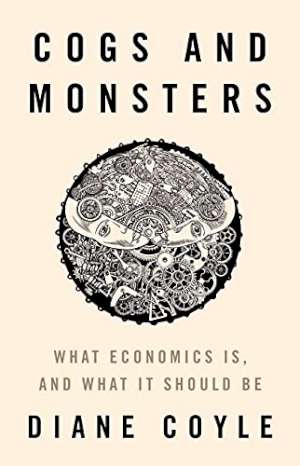29 November 2021
Cogs and Monsters
what economics is, and what it should be
Diane Coyle
2021, Princeton University Press, 240 pages,
ISBN 9780691210599
Reviewer: Matt Whittaker, CEO, Pro Bono Economics

Anyone who has been fortunate enough to hear Diane Coyle speak on almost any subject over the past 20 years or so will know that she is a perceptive thinker and a persuasive communicator: restless in her pursuit of better understanding how economies really work and filled with a passion that can’t help but infect others. Cogs and Monsters is therefore something of a treat, drawing as it does on material presented across a number of lectures over the course of several years.
Recycled though much of the work is, this is no simple “greatest hits” compilation. By setting the work against the backdrop of the very evident challenges facing economics in the post-financial crisis and post-pandemic world, Coyle is able to give her material a freshness and urgency which makes it hugely compelling.
For sure, the somewhat modular approach to writing isn’t without its problems: not least the difficulty of picking out a straightforward narrative. The book starts with a defence of economics against outdated criticism, before presenting a series of critiques of its actual failings. It then pivots into a discussion of how the study of economics and its use in policy making needs to adapt to the much-altered realities of the digital world. The thinking is clearly linked, but the subject matter – the condition of economics – is almost overwhelmingly broad and the thread running through the chapters isn’t always obvious.
And there is at least some repetition in here, with problem statements that appear in one chapter being re-presented at later stages just as they might have been in the stand-alone lecture from which the material has been drawn.
But none of this really matters, because the final product is a book which is overflowing with ideas (in marked contrast to some economics texts which contain just one insight endlessly described). And the deeper you head into the book, the more you realise that the real link between each chapter is the author herself.
We’re presented with a fascinating insight in Coyle’s own evolution of thinking, with each argument standing on the shoulders of its predecessors. And the whole thing feels very personal. This is very distinctly a book about Diane Coyle’s experience of, and perspective on, economics. It couldn’t have been written by anyone else.
Given the nature of the argument presented, this is very fitting. The underlying message of the book is that economists need to embrace the social and supplement their technical ability with a humanity and concern for political economy: by so clearly articulating the importance of context in her own journey, Coyle makes the argument all the more powerful. Perhaps just as importantly, the anecdotes which come out in the ‘intermissions’ between chapters are also great fun – adding considerably to the book’s readability.
The arguments themselves are well-made: satisfyingly nuanced yet also very intuitive. The chapter from which the book takes its title is perhaps the highlight, dealing as it does with the myriad ways in which the study and application of economics has found itself trailing in the wake of the real-world developments associated with the forward march of the digital economy. The appeal to place a greater emphasis within economic policy making on social norms, dynamism, leadership, interdependence, inequalities and innovation matters not just from an academic perspective. As Coyle argues:
“Expertise is a claim to authority over the lives of others, so if it fails to deliver it is not surprising that people challenge the constraints it imposes on them, by voting for anti-elitists for example.”
There is a healthy dose of optimism in the book too. We are taken frequently to the edge of despair, with the limitations of economics to properly capture – and prepare for – what is going on in the world around us at times feeling too hard to overcome. But then we are reminded of the many ways in which economic thinking and practice is already changing. Or indeed approaches derived from history which are ripe for renewal.
Coyle herself admits to veering “between optimism about the signs of change and pessimism about the scale of what is needed”. But, as she rightly notes, the experience of the pandemic suggests that the profession has what it takes – if prompted – to rise to the considerable challenge it faces.
Cogs and Monsters should serve as that prompt: infiltrating and influencing thinking across many different branches of economics. It is, ultimately, one of those books that readers will find themselves referencing again and again in conversations of all different types: “That’s very interesting, but have you seen Diane Coyle’s work on this?”. Less a “greatest hits” compilation and more a concept album that anyone who’s serious about economics needs to have in their collection. It certainly hits all the right notes.
